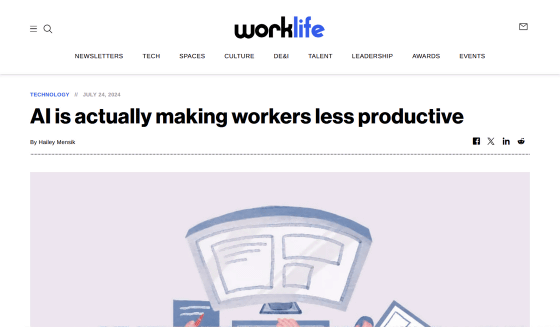'AI is actually reducing employee productivity'

There's a lot of promise that generative AI tools could replace a variety of time-consuming tasks and dramatically increase productivity in the workplace. But a survey of more than 2,500 workers and managers found that in fact, generative AI tools increase workload and hinder productivity.
AI is actually making workers less productive - WorkLife

Upwork , a freelance platform based in California, USA, conducted a survey of more than 2,500 full-time employees, freelance workers, and business owners to find out whether they thought using generative AI at work had improved their productivity.
As a result, nearly 80% of workers who use generative AI at work said that it increases their workload and impedes their productivity -- the exact opposite of the hope that generative AI tools would reduce tedious tasks traditionally performed by humans and significantly increase productivity.
Workers who responded to the survey said they are spending more time reviewing and moderating content generated by AI, as well as more time learning how to use the tools. In the Upwork survey, about 96% of executives expected that 'AI will improve productivity,' while about 40% of employees said that they 'don't know how AI will improve productivity,' showing a disconnect between management and the field.
'Employers will need to adjust their expectations and approach to AI to effectively integrate new technologies and get a reasonable ROI . But the benefits will likely be less than employers expect,' WorkLife, a web media outlet for labor and human resources, said in a statement.

'What's happening is that the AI hype bubble is so big it's out of proportion to the impact of the way it's being deployed right now,' said Emily Rose McRae, senior director analyst at management consulting firm
In fact, the board of directors of one client that McRae spoke to estimated that the introduction of generative AI would enable them to reduce their workforce by about 20%. However, none of the companies have come close to achieving such a reduction in workforce through the introduction of AI, so it is not easy to conclude that 'we can reduce our workforce because we have introduced AI.'
The problem with generative AI tools is that they still have imperfections, such as hallucinations and fabricating answers that sound reasonable. While AI can certainly help put things together, it is essential that humans review the materials and facts before applying them to real business. This means that the introduction of generative AI does not necessarily lead to increased productivity in all cases.
Of course, in some fields, generative AI is helping workers save time, such as in the legal field, where AI tools help lawyers research and analyze existing case law and summarize vast amounts of information. There are also beneficial use cases, such as introducing chatbots equipped with generative AI into companies to significantly reduce the time it takes employees to learn how to operate new software and complete tasks, or reducing the burden on HR by answering employee questions and directing them to the right internal resources.
However, in either case, humans are needed to validate the output, and neglecting the time-consuming review process poses various risks. Kelly Monahan, managing director and head of the Upwork Research Institute, said, 'Many large-scale language models only work well when there is a human in the loop and human judgment and oversight. That's the current state of the technology.'

Monahan points out that to use generative AI tools to improve productivity, you need to think about 'what is the business problem you are trying to solve?' However, rather than rethinking how they do their work to take advantage of generative AI tools, workers feel left behind by technology.
According to a survey by Upwork, about 40% of workers feel that their companies are asking them to do too much with AI and are spending a lot of time self-teaching themselves how to use generative AI tools. McRae argues that employers can better support their employees by holding focus groups on generative AI tools to determine exactly what barriers employees are facing and what training they need.
'If your top priority is for employees to try out generative AI and learn how to use it, make sure you have real examples of what you want the AI to do, and give them the tools and space to learn how to do it,' said McRae. 'But at the same time, be very open to feedback that says, 'The AI doesn't do what we need it to do,' or, 'The AI doesn't actually work.''
◆ Forum is currently open
A forum related to this article has been set up on the official GIGAZINE Discord server . Anyone can post freely, so please feel free to comment! If you do not have a Discord account, please refer to the account creation procedure article to create an account!
• Discord | 'Please tell me about cases where the introduction of AI has actually increased the amount of work involved!' | GIGAZINE
https://discord.com/channels/1037961069903216680/1290237379919085589
Related Posts:
in Note, Posted by log1h_ik







